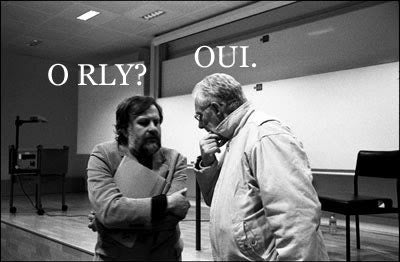'Long Live the Dialectic', Long Live the Nothing

Steven Connor, in the Times Literary Supplement, sums up the major importance of Slavoj Žižek's ''everlasting gobstopper of a book" Less Than Nothing. In a single paragraph, Connor explains Hegel's Phenomenology of Spirit as the 'engorgement' of Spirit through the dialectical movement of history (spirit meets its negative antagonist in the form of matter or the material world and responds by both preserving and overcoming both thesis and antithesis through the process of sublation), the principle of the postmodernist reaction to it (denouncing the Hegelian dialectic as one of several totalising conceptions of the world that it rejects) and finally Žižek's critical thrust that manages to:
both discredit postmodernist arguments in their dependence on a dishing of Hegel, and to endorse the objections to totality that are key to those postmodernist arguments.
For Žižek, History is not about a teleological progress toward the absolute consolidation of Spirit, but rather about its self-division or "the inherent self-distancing of the One itself". The Spirit, or rather Subject, does not precede negation nor does it undergo some process of negation from a coherent whole. Rather, as Connor sums up, "oneness is plucked out retroactively from a primary condition of division". He calls this kind of operation 'boot-strapping', referencing the idiomatic American mythology of 'pulling oneself over a fence by one's bootstraps'–an absurdly impossible action. Of course, this is precisely the type of adynaton that Žižek champions, for they are the driving principle of history and politics as "every authentic act creates its own conditions of possibility". This means that the revolutionary impulse does not result from some naïve historical scientism, but rather, nothing, so that "each stage 'rewrites the past' and retroactively de-legitimizes the previous one". Furthermore, the retroactive revolutionary form is determined not from the present, but from the future: "each historical form is a totality which encompasses not only its retroactively posited past, but also its own future, a future which is by definition never realized". Hence Less Than Nothing is the excess of negation, which extends into the future.

It is in this sense that perhaps we can understand why Žižek, Badiou, and others construct a philosophy that attempts to break with history, whilst remaining within this world. The insistence on "the possibility of the impossible"—in Badiou's case the event that comes from the void, and for Žižek the aufheben from less than nothing (the future)—along with the rejection of History (capital H for its totalizing status, big Other, etc.) comes from an acknowledgement of the failure of the old communist projects, a militant refusal to capitulate to capital, and finally the desperate hope for something radically new.
In Less Than Nothing as well as his newest offering The Year of Dreaming Dangerously, Žižek, as noted by Benjamin Kunkel in the New Statesman, remains resolute in his stance that "capitalism can't be reformed." There is nothing redeemable or savable in the present or the past, including political parties, Keynesianism, etc. Furthermore as Kunkel summarises:
Žižek sees in various popular discontents the chauvinist misprision, the consumerist absence, the communalist disguise or the anti-capitalist incipience of his own politics. Radical politics at its most basic consists of two elements: strategy and programme or how to get power and what to do with it. Žižek's programme is straightforward: the replacement of capitalism by communism.
However he makes a critical point that
the time is past for the left to content itself with the blank proposition that another world is possible. What traits, other than its otherness, would such a world possess? As liberal capitalism saps its ecological foundations, defaults on its economic promises and forfeits its political legitimacy, another world is becoming inevitable. Which one do we want? And can we make this one into that one before it's too late?
These questions remain open. Perhaps the future might provide us with answers.
Visit the New Statesman to read Benjamin Kunkel's review in full.
Steven Connor's review can be found in this month's Times Literary Suppliment.
